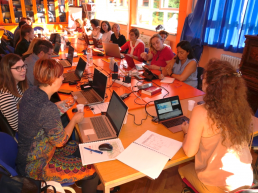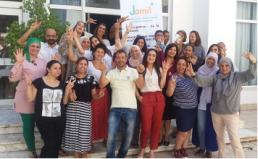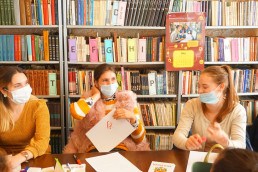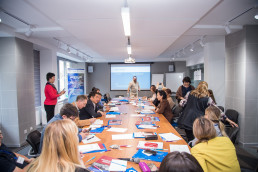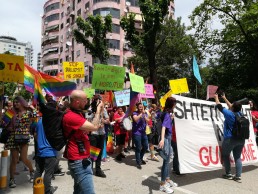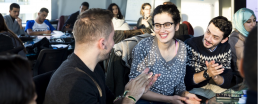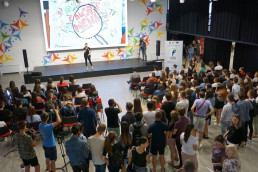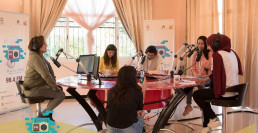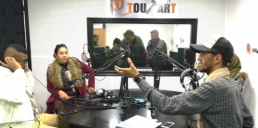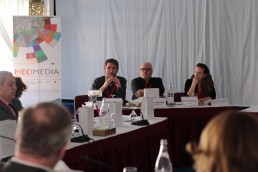IN EDU - INclusive communities through Media literacy & Critical Thinking EDUcation
IN EDU is a 36-month project run by seven European partners based in Italy, Bulgaria, France, Croatia and Slovenia. It focuses on developing good practice in media literacy and critical thinking education via inclusive, non-formal learning programmes which combine training and events at community level. The main aim of the project is to reinforce media literacy and critical thinking among students.
The IN-EDU engagement programme does this through interactive activities at local level that encourage action and participation from teachers, parents and families, and other stakeholders –increasing their awareness, knowledge and competences on the subject. These activities include traning, civic hackathons and an international student camp. By working at local level the project intends to have an impact on the wider communities and play a part in preventing marginalization and countering inequality.
Timeline
- October 2019: Media and Information Literacy training of trainers for teachers from five countries
- December 2019: A curriculum and teaching resources in media literacy available in six languages (Bulgarian, Croatian, English, French, Italian and Slovenian.
- January – June 2020: Training of teachers in four countries.
- November 2020 – March 2021: Four civic hackathons.
- December 2020 – July 2021: 10 inclusive media campaigns.
- March 2021: Student Summer Camp for students from each partner country.
- Throughout the project: National and international stakeholder meetings and recommendations for policy makers.
Partners
- FORMA.Azione Srl (Italy)
- Sofia Development Association (Bulgaria)
- Centre for Peace, Non Violence and Human Rights (Croatia)
- PRIZMA Foundation (Slovenia)
- DZZD “Obuchenie” (Bulgaria)
- ITET Perugia (Italy)
JAMIL.Net - Jeunesse Active Medias Inclusifs et Littératie Numérique
JAMIL.Net stands for Active Youth, Inclusive Media and Digital Media Literacy and aims to help young Tunisians better engage in society by giving them the skills and tools to become active participants in their local communities.
JAMIL.Net particularly engages with young women and men in the interior and poorer governorates through a program of Media and Information Literacy (MIL), access to employment in the field of Media and Information, and support to local community media. Our project targets 6 governorates (Tunis; Kasserine; Beja; Gafsa; Kebili; Gabes) and provides the infrastructure needed by building a network of MIL centres in local communities that will facilitate access to employment for the most vulnerable youth. It will also strengthen the local community radios, including their financial sustainability, increasing their capacity to engage with youth via targeted MIL and youth-focused productions that cover important social and human rights issues.
Timeline
- October 2018: Project launch
- July 2019: First Training of Trainers
- June 2020: Second Training of trainers
- Spring 2021: Launching of the MIL centers
- May 2021: Hackathon for youth
- August 2021: Advertisement platform for community media
- September 2023: 150 youth accessing to employment
Donors
- AFD
- IREX’s « Encouraging Inclusive Public Participation in the Near Eastern Affairs Region” (EIPP)
- Fondation de France
- Fondation Drosos
Strengthening Independent Media and Media Literacy in Moldova (SIMML III)
Since September 2018, SIMML III aims to strengthen Moldovan’s population’s resilience to fake news, propaganda and manipulation through the media by building media literacy skills, promoting civic interaction and through strengthening local reporting on key national, European and international issues.
Librarians are trained in media literacy skills bringing them to the level where they can run their own MIL activities in the communities. Media corners where citizens can access news and information with guided assistance from librarians have been set-up in partner libraries under a small grants scheme. To improve the quality and quantity of media reporting on social and political issues, we work with Moldovan media to build the capacities of a new generation of journalists through learning-by-doing internships. An important part of our project is to promote civic participation. We combine our media production and media literacy components by organizing public discussion sessions in partnership with local libraries – and the librarians who’ve undergone our MIL training program. Through small grants for regional media, the project aims to support independent regional media and improve quality of their reporting skills.
Timeline
- Project launch: September 2018 (SIMML III). The SIMML project has been running since September 2014.
- July 2020: Open source online manual and online MIL toolbox. Institutionalization of MIL curriculum for librarians.
- September 2019: MIL Training of Trainers for Senior Trainers.
- On-going: Capacity building for the Moldovan Association of Librarians. MIL outreach events.
- Ongoing: MIL Training of trainers for librarians. Local workshops run by librarians who received ToT training. Media corners grants for the most active trained in MIL librarians.
- Ongoing: Small grants for independent media. Learning by doing young journalism train
- Ongoing: Organization of discussions and awareness raising events around women’s rights, with a particular focus on media literacy vis a vis women’s rights.
- December 2021: End of the project
Partners
- Asociația Bibliotecarilor din Republica Moldova (ABRM)
- Europa Libera
- Ziarul de Garda
- NewsMaker
- TV8
Promoting media plurality, balance and media literacy in Central Asia
The ‘Promoting media plurality, balance and media literacy in Central Asia’ project aimed at increasing the resilience of the Central Asian population to external false news and disinformation.
Together with our partners, we provided Media and Information Literacy training of trainers to different types of educators, including high school teachers, university professors and librarians, alongside developing teaching manuals for them to use in their classes.
Achievements
- 559 educators took part in Media Literacy training of trainers workshops across Kazakhstan, Kyrgyzstan and Tajikistan (103 university professors, 322 school teachers and 134 librarians).
- Media and Information Literacy teaching manuals were developed for schools, universities and librarians and are available in Russian, Kyrgyz, Kazakh and Tajik.
- In Kyrgyzstan our schools curriculum was accepted by the Ministry of Education and is now taught in schools across the country
- The online tool Media Sabak is available in Russian, Kyrgyz, Kazakh, Tajik and Uzbek.
Pride I - Promoting Rights Inclusiveness Dignity and Equality for LGBTI in Albania
PRIDE I aimed to strengthen the role of grassroots civil society organisations’ (CSOs) in promoting the acceptance, inclusion and protection of the LGBT minority in rural and urban Albania, with a particular focus on protecting at-risk marginalised youth LGBTs, and promoting respect for the fundamental rights of the LGBT community.
The proposed 24-month action was divided into 3 linked components: 1) Capacity building for CSOs; 2) Service provision to the LGBT community; 3) Awareness raising on LGBT issues.
Achievements
- 3 capacity building assessments were carried out and training sessions organized for the partner organisations
- The news portal Historia-ime platform has been updgraded
- More than 300 LGBTI individuals accessed basic services and a safe place to socialise
- 24 LGBTI homeless youth were supported by Streha Shelter to reintegrate society
- 12 journalists were trained
- One monitoring of hate speech was organized
- One nation-wide online and offline campaign was organized
- 9 young LGBTI activists benefited from small grants
D-JIL “Digital Generation”
D-JIL aims to offer young citizens, from nine countries in the MENA region, the opportunity, resources, training and mentoring to create and produce digital content for new generations of youth. The project aims to help them to become more active citizens, involved in their communities and public life.
ERIM leads the implementation of the Media and Information Literacy workshops to help the project teams incorporate Media Literacy into their activities and receive feedback from their youth audience.
Timeline
- 2018 – 2019 : Call for proposals to select the 30 best projects focusing on digital content intended to meet the expectations of young people and to help them to become involved in public and local life
- 2018 – 2019 : Hackathons to bring the teams together to share ideas, receive targeted training and mentoring aimed at helping them refine and develop their project ideas
- 2019 – 2021: Subgrants to 18 projects to transform their ideas into actual projects
- 2019 – 2021: Capacity building and personalized mentoring to award winners
- 2019 – 2021: Media and Information Literacy workshops in 7 countries
Donors
- European Union
Empowering Youth to Become Civic Actors (EYCA)
Our Empowering Youth to become Civic Actors (EYCA) project aimed at increasing freedom of expression in Moldova by empowering youth from rural areas to become civic actors. The project provided training to young people in Media and Information Literacy (MIL) and blogging, to encourage them to report on social issues in their local communities.
In parallel the project encouraged local media in the raions to collaborate with young people and local authorities in order to improve their own media content and increased civic dialogue in the rural areas, including through public events on social and political issues.
Achievements
- Over 1300 young people were trained in understanding and reporting on social and political issues through media literacy activities.
- Over 300 media products were created by the young people involved in project training sessions and events and half were published on youth platforms collaborating in the project.
- 2 Moldovan Multimedia Connector events were held for 360 young participants
- 6 Media Tours led by well-known Moldovan bloggers and social media activists were organised for young people across the country.
- 10 city halls have updated their web/social network pages as a result of the project.
- 11 independent local media in different raions across Moldova improved their audience engagement and developed links with young people and local authorities
- 700 people attended public discussions on social and political issues
Freedom of Expression, Association and Assembly in Morocco (FEAAM)
The overall goal of the project is to foster the effective implementation of a legal framework in Morocco which is conducive to freedom of expression, association and assembly, and consistent with international standards and best practices.
The project’s first component focuses on supporting the implementation of new laws and regulations by providing input into new draft laws or draft revised laws under review, analyzing the current legal and regulatory framework in Morocco and advocating for compliance with International standards.
The project also works to foster and support a broad-based movement of civil society groups, along with a coordinated strategy to improve public understanding and support of freedom of expression, association and assembly. This is done through reinforcing media and civil society groups to perform a watchdog role for society, thus supporting implementation of current laws consistent with international human rights norms.
Timeline
- August 2017: Project launch
- 2017-2021: Policy dialogue – a series of technical meetings with (Ministries, parliamentary groups, etc.) led by media and civil society organizations (CSOs)
- 2018-2020: White papers published on Freedom of Expression, association and assembly
- 2018-2021: Capacity building training workshops for CSO, journalists and lawyers
- 2018-2019: Regional blog tours on Fundamental Freedoms held for bloggers and human rights defenders
- 2018: CSOs and media representatives attend international events
- 2019-2020: Peer-to-peer study visits for policy makers
- 2020: Advocacy for the legal recognition for community radios in Morocco
- 2020: Dialogue with the Open Government Partnership (OGP) Monitoring Committee
Donors
Special thanks to our donors:
- US Department of State Bureau of Democracy, Human Rights, and Labor (DRL)
Partners
Special thanks to our partners:
- ADALA pour le droit à un procès équitable
- UNESCO regional office for Maghreb countries
- ARTICLE 19 MENA
- Association Initiatives Citoyennes (AIC)
Community information and active citizenship in the governorates of Tozeur and Kebili (TOKE)
The TOKE project developed community-based information and citizen mobilization in the regions of Tozeur and Kébili. We worked to develop freedom of expression and increase understanding and discussion of local and regional issues. We did this by working with community radios to build their capacities and professionalise their work. As such, the project has contributed to strengthening community radios in producing local information and enabling citizens to express themselves through innovative radio programming.
The project also focused on media and information literacy for young people from 4 Youth Centers in Tozeur and Kebili. We worked to develop critical thinking and strengthen their capacity to prioritize continuous flows of information published online as well as exchange and discuss current affairs in their regions.
Achievements
- Workshop on innovative economic models organised for 6 managers of Djerid FM and Nefzaoua FM
- Two financial sustainability strategies developed
- Training of trainers for ATMA staff on MIL, community journalism and radio animation
- Six trainings in community journalism and radio animation techniques for journalists from Djerid FM and Nefzaoua FM
- The production of 2 pilot radio programs
- 16 MIL activities implemented by young participants in the 4 Youth Centers in Tozeur and Kebili and MIL workshops in youth centres, which were also the subject of radio broadcasts by Djerid FM and Nefzaoua FM
- 100 young people strengthened their skills to understand and use the media responsibly
- Development of a MIL manual and a community journalism and radio animation manual
Med Media: Towards media sector reform in the Southern Mediterranean region
The Med-Media project strengthened and promoted public service orientated media in the MENA region through building:
- greater public trust in local media,
- enhanced capacity among media practitioners,
- a more competitive public service media,
- better focused international development work, and
- new platforms for dialogue and knowledge sharing
This was done through peer-to-peer mentoring and providing support and assistance to broadcasters to make qualitative improvements to their outputs, improve their engagement with their audiences, and boost their use of social media.
Achievements
- Establishment of a Special Mechanism for Media Freedom in the Arab World and the Declaration for Media Freedom in the Arab World.
- Peer-to-Peer exchanges were organised between Southern Mediterranean and European institutions, as well as between public service broadcasters from the region.
- “Youth on Screen” acted as a catalyst for programme ideas which improved the representation of young people on TV screens across the region and enabled them to engage in public dialogue.
- Creation of Khabirat, an online Arabic-language directory of women experts.
- The Declaration for Media Freedom in the Arab World.
Donors
- The European Union
